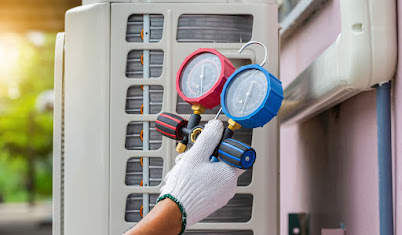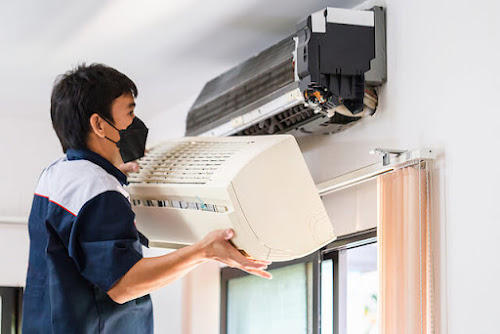How to Address Gas Leaks in an Air Conditioning Unit?
Introduction
Air conditioning units are a welcome relief during the sweltering heat of summer, providing us with cool, comfortable indoor environments. However, when something goes wrong with your AC system, it can be a cause for concern, especially if you suspect a gas leak. Gas leaks in air conditioning units can be hazardous, both for your health and the environment. In this blog, we'll explore the signs of a gas leak, the potential dangers involved, and the steps you should take to address this issue safely and effectively.
Understanding the Gases in Air Conditioning Units
Before delving into gas leaks, it's essential to understand the types of gases used in air conditioning units. Most residential and commercial AC systems use one of two common types of refrigerants:
1. Hydrochlorofluorocarbon (HCFC): These refrigerants, such as R-22, have been widely used in the past but are being phased out due to their harmful impact on the ozone layer.
2. Hydrofluorocarbon (HFC): More environmentally friendly, HFC refrigerants like R-410A are becoming the industry standard.
Regardless of the type of refrigerant used, a gas leak can have harmful consequences, and prompt action is essential.
Signs of a Gas Leak
Detecting a gas leak in your air conditioning unit requires vigilance. Here are some common signs that may indicate a gas leak:
1. Unusual Smells: Refrigerant gases often have distinct, sweet or chemical-like odors. If you notice an unusual smell near your AC unit, it could be a sign of a leak.
2. Hissing Sounds: A gas leak might produce a hissing or bubbling sound as the gas escapes from the system.
3. Reduced Cooling Efficiency: If your air conditioner is no longer providing adequate cooling, it may be due to a refrigerant leak, as the system struggles to absorb heat.
4. Frozen Coils: Refrigerant leaks can lead to the freezing of evaporator coils, causing ice buildup.
5. Higher Energy Bills: A refrigerant leak forces your AC unit to work harder, resulting in increased energy consumption and higher utility bills.
Safety Precautions
If you suspect a gas leak in your air conditioning unit, it's crucial to prioritize safety. Refrigerant gases, when inhaled, can be harmful to your health. Here are some safety precautions to keep in mind:
1. Ventilation: Ensure proper ventilation by opening windows and doors to allow any leaked gases to dissipate.
2. Evacuation: If you suspect a significant gas leak, evacuate the premises immediately, and do not return until the issue has been resolved by a professional.
3. Turn Off the AC: Shut off your air conditioner to prevent further gas leakage.
4. Do Not Use Open Flames: Avoid lighting matches or using open flames, as some refrigerants are flammable.
5. Seek Professional Help: Gas leaks are not a DIY fix. Contact a licensed HVAC technician to assess and repair the leak safely.
Addressing Gas Leaks in an Air Conditioning Unit
Addressing a gas leak in your air conditioning unit requires the expertise of a professional HVAC technician. Here's how the process generally unfolds:
1. Diagnosis: The technician will begin by locating the source and severity of the gas leak. This involves using specialized equipment to detect refrigerant levels in the system.
2. Repair: Once the leak is identified, the technician will proceed with the necessary air conditioner repair in Melbourne. This may involve replacing damaged components, such as coils or tubing, and ensuring that all connections are properly sealed.
3. Recharging: After repairing the leak, the technician will recharge the AC unit with the appropriate amount of refrigerant to restore its efficiency.
4. Leak Testing: To ensure that the repair was successful and no other leaks exist, a leak test will be performed. This involves pressurizing the system with nitrogen and using a leak detector to check for any remaining leaks.
5. Final Inspection: The technician will conduct a final inspection to ensure that the AC unit is operating correctly and safely.
6. Preventative Measures: To prevent future leaks, consider scheduling regular maintenance for your air conditioning unit. Routine check-ups can help identify and address potential issues before they escalate.
Environmental Impact and Regulations
Gas leaks not only pose health risks but also have environmental consequences. Some refrigerants are potent greenhouse gases, contributing to global warming when released into the atmosphere. To mitigate these environmental impacts, many countries have implemented regulations to phase out certain types of refrigerants, such as HCFCs.
In addition to environmental regulations, proper disposal and recycling of refrigerants are essential. HVAC technicians are trained to handle refrigerants safely and in compliance with environmental laws.
Conclusion
Gas leaks in air conditioning units should never be taken lightly. They pose risks to your health, your safety, and the environment. If you suspect a gas leak in your AC system, prioritize safety by ventilating the area and contacting a professional HVAC technician immediately. With prompt and expert attention, gas leaks can be safely repaired, allowing you to enjoy the cool comfort of your air-conditioned space while minimizing environmental impacts. Remember that when it comes to gas leaks, safety should always be your top priority.


Comments
Post a Comment